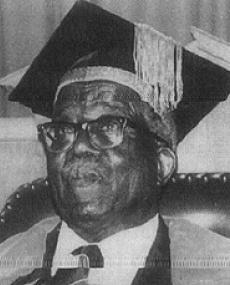
Moses Josiah Madiba was born 22 November 1909 in Seshego, Pietersburg District. He was one of the seven children of Jesaya Sekgoadi and Johanna Sebolaishi. Although Ndebele-speaking, Madiba preferred Northern Sotho as a communication medium. He received his primary education in the Pietersburg district at Ga-Madiba, Mashashane Lutheran School and Setotolwane. From 1926 to 1929 he studied for a teacher's diploma at Kilnerton Institution, a Methodist college in Pretoria.
Through private and full-time study he later improved his qualifications, Junior Certificate in 1930, matric in 1933 and the B.A. degree in 1941 with a Transvaal Education Department bursary, and the U.E.D. in 1942. He obtained the latter two qualifications from the South African Native College (later University of Fort Hare). Madiba's teaching career started in July 1929 when he was appointed principal at the Makapanspoort primary school in the Potgietersrus district. From April 1930 to June 1935 he was principal at the Kalkspruit Amalgamated School. This post he held until he became principal of the Kratzenstein Higher Primary School at Pietersburg for a year.
In July 1936 he was appointed as supervisor of schools in the Pietersburg West Circuit, the highest post an African teacher could aspire to at that time. After a year he became principal of the Potgietersrus Bantu Secondary School. With the founding of the Pretoria Bantu Normal College in Atteridgeville, a postmatriculation teacher training college, Madiba became lecturer and warden in 1947. While warden, he introduced hostel committees consisting of senior male and female students in order to teach and promote group discipline and a sense of responsibility among students. In 1948 Madiba returned to Potgietersrus as founder principal and superintendent of Mokopane Teachers' Training Institution (Mokopane College of Education), a state-owned college that incorporated the Potgietersrus Bantu Secondary School.
In 1957 Madiba was one of the first Africans to be appointed as a sub-inspector of Bantu Education. Two years later he was seconded back to Mokopane in order to reorganize the college. In 1961 he returned to his position as sub-inspector and in 1965 became Bantu Inspector of Schools. When the Department of Education and Culture of the Lebowa Government Service came into being in 1969 he was appointed as its first education planner. Madiba was a protagonist of mother tongue instruction and of the mother tongue as medium of instruction in the primary school. Furthermore, he propagated the training of primary school teachers in the mother tongue as this would result in better training.
This viewpoint led to severe criticism and political controversy, yet in pursuance of his conviction and his commitment to mother tongue instruction he developed the Northern Sotho language terminology that led the Department of Bantu Education language committees to compile Sotho terminologies in other subjects as well. He was also the author of several school textbooks, stories and novels in Northern Sotho. His books Thuto ya Polelo (1941), Tsiri (1942), Mahlontebe series (1952) and Nkotsana (1955) are still widely read in Northern Sotho schools.
Madiba was the first secretary of the Maune branch of the Transvaal. African Teachers' Association (TATA) in 1930. He was also secretary of the Northern Transvaal Teachers' District Association of TATA, and served in several committees of this organization. In 1954 he was co-founder of the Transvaal Teachers' Union (TTU) and became its educational advisor. He represented the TTU on the Advisory Board for Native Education in the Transvaal. In 1960 he was appointed first chairperson of the advisory council of the newly established University College of the North, a position he held until 1973. He served as chairperson of the university's education committee as well, and on 13 May 1978 was installed as the first African chancellor of the University of the North.
Madiba was a recipient of the British Council Visitor's Grant. This enabled him to study primary and secondary teacher training in Britain, as well as the teaching of English to foreign students in 1964. He was a member of the government commission to Malawi, studying the youth in that country. In 1973 he received an honorary D.Ed. from the Faculty of Education at the University of South Africa for meritorious services as linguist, author, educationist and community leader. Besides his numerous commitments in the field of education Madiba made room for community service. He was a lay preacher and elder in the Lutheran Church and president of the Evangelical Lutheran Church Synod, Transvaal. He was chairperson of the constitutional committee when the Northern and Southern Transvaal synods merged, and served from 1963 as first president of the new synod. He was also deputy chairperson of the Lebowa Legislative Assembly. In Mashashane a junior secondary school bears his name and at the University of the North a dining hall and student residence are also named after him. He married Johanna Margaret Ledwaba in 1936. The couple had two sons and five daughters. He died in his home after a short illness.